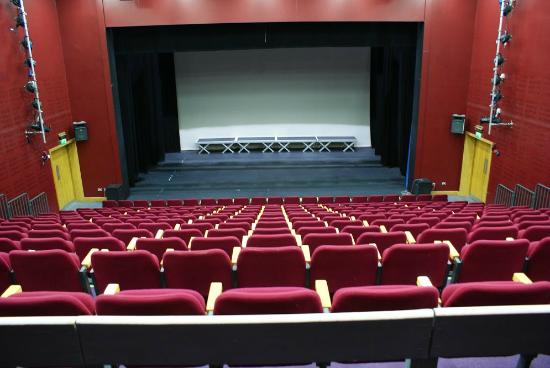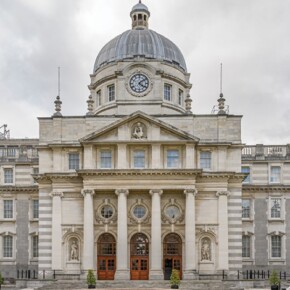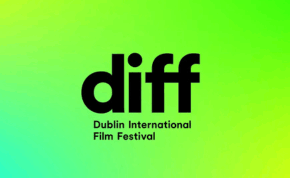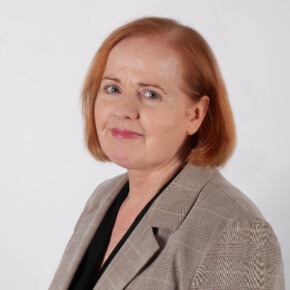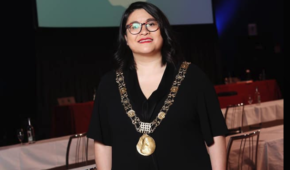Traveller and Roma Culture comes to life in DCU
Padraig Conlon 16 Mar 2023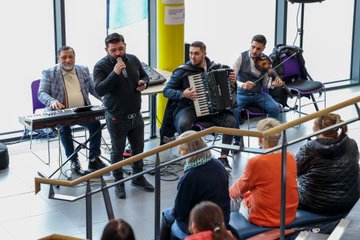
Last Tuesday, March 14, Meath Traveller Workshops brought their ‘Living Traveller History Exhibition’ to Dublin City University (DCU) as part of a ‘Traveller and Roma Cultural Celebration’ event, which was hosted by a collaboration between College Connect, DCU Access, and DCU Students’ Union.
Students and visitors were invited to step back in time to a scene reminiscent of 1950s Ireland, as the Mall of DCU’s Glasnevin Campus became a time-capsule campsite.
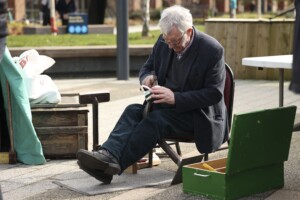
A tinsmith worked hard next to a campfire nestled between a traditional Traveller barrel-top wagon and bow tent.
The scene drew the interest of DCU students and visiting local schools, Traveller community groups and the wider DCU community, Pavee Point and National Traveller MABS.
Later, the U building played host to lively entertainment, as a concert with performers from both communities entertained a packed foyer.
Trish Reilly treated those in attendance to a powerful performance of traditional Irish Traveller folk songs.
Before the Roma jazz band Musicantia rocked the venue with a lively rendition of the rich and diverse Roma music and singing traditions, which touched on the history and culture of the Roma people and got many in attendance dancing.
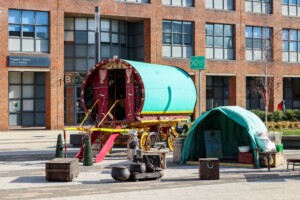
The day was rounded up with a sold-out, intriguing workshop presenting the history, vocabulary, and features of the Traveller Cant and Gammon languages.
The workshop was led by Author Oein DeBhairduin, Traveller Culture Collections Development Officer with the National Museum of Ireland, and Mary McDonagh of Mary Mc Productions, who led the (adult) audience in a energetic rendition of Head, Shoulders, Knees and Toes with their newly acquired Cant/Gammon vocabulary for human body parts.
Oein also shared extracts from his book, Why the Moon Travels – a haunting collection of stories rooted in the oral tradition of the Irish Traveller community.
The event, which was the third in a series of four, was organised by College Connect, DCU Access, and DCU Students’ Union.
College Connect has previously run successful Traveller and Roma Cultural Celebrations in Maynooth University and Dundalk Institute of Technology.
Such events highlight and promote the visibility of Traveller and Roma culture on college campuses and help create an environment where current and potential students from these communities not only belong but can thrive.
They promote understanding, respect, and help break down stereotypes between Traveller and Roma students and the wider college community.
Community Connector DCU and event organiser Antoinette Patton said, “When students see their culture celebrated on campus, they feel a greater sense of belonging and are more likely to engage with the campus community. This can lead to increased academic success, retention, and graduation rates. Promoting cultural visibility of minorities is an important step towards creating a more equitable and inclusive society.”
College Connect Project Manager Ayoma Bowe said, “The cultural visibility of minorities on campus can help to break down stereotypes and promote understanding and respect between different cultural groups. It allows students to learn about and appreciate the diversity of experiences and perspectives within their own campus community and beyond.”
The event comes in the context of the success of another College Connect-supported project, Whidden Workshops: It’s Kushti to Rokker (WWKR), being awarded an Aontas Star Award for ‘Adult Learning Initiative That Supports Third-Level Access and Engagement.’ WWKR brings together current and alumni students from the Traveller and Roma communities with university staff to provide guidance to prospective students on thinking about, going to, and getting through college. They provide an opportunity for potential students to receive insights directly from their peers.
College Connect is a regional access programme that aims to widen participation by enhancing educational aspirations and opportunities for the most socio-economically disadvantaged people in the Midlands, East, North Dublin (MEND) region. The project is led by Maynooth University in partnership with DCU, Technological University of the Shannon (Athlone Campus), and Dundalk Institute of Technology.




